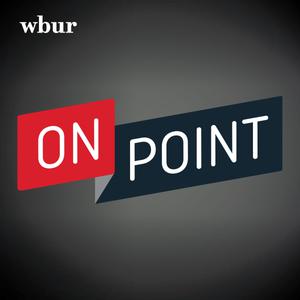
Diane Rehm: On My Mind
WAMU 88.5
Diane Rehm’s weekly podcast features newsmakers, writers, artists and thinkers on the issues she cares about most: what’s going on in Washington, ideas that inform, and the latest on living well as we live longer.
- 31 minutes 30 seconds"Donald Trump is daring opponents: 'Come and get me!'"
It has been ten days since Donald Trump was inaugurated for his second term as president. Since then, he has signed a flurry of executive orders, pardoned every January 6th defendant, pushed through controversial cabinet picks, and made moves to completely reshape the federal workforce.
And by most accounts, the Democratic response has been ... tepid.
“Donald Trump is charting new ground for a president,” says Susan Glasser, staff writer at The New Yorker. “He is daring opponents: 'Come and get me!'"
So far, Glasser adds, nobody has taken him up on the dare. But this week’s federal funding debacle might have changed the equation and given Democrats an opening.
Glasser is also co-author of a book about Trump’s first four years in the White House titled The Divider, and says he seems poised to take advantage of this opportunity for a do-over. She joins Diane to talk about what we’ve seen from the new administration so far and what, if anything, Democrats can do to put a check on his power.
30 January 2025, 8:47 pm - 34 minutes 41 secondsBishop Mariann Budde on her plea to Donald Trump
Episcopal Bishop Mariann Edgar Budde delivered a sermon at the National Cathedral on Tuesday in honor of Donald Trump’s inauguration. She ended with a direct address to the president.
“Let me make one final plea, ” she said. “In the name of our God, I ask you to have mercy upon the people in our country who are scared now.”
She went on to mention gay, lesbian and transgender children “in Democratic, Republican, and Independent families, some who fear for their lives.” She talked about families in the country without documentation who are terrified of being torn apart.
In response, the president demanded an apology, claiming Budde brought politics into the church. But Bishop Budde says she stands by her words, and that reminding the country of our shared humanity is part of her duty as a member of the clergy.
Bishop Budde is Diane’s faith leader, and she joins her today to explain why she felt she had to speak up and why she feels no need to apologize.
23 January 2025, 10:00 pm - 32 minutes 54 secondsWhat's with Donald Trump and Greenland?
What’s behind Donald Trump’s obsession with Greenland?
Most of the island is covered in ice, less than sixty thousand people live there and, until recently, it was best known for snowy photos of polar bears. But climate change has changed the equation and thrust the island into the middle of global politics.
Donald Trump has repeatedly said he’d like to buy the territory, and last week at a news conference he said that taking military action to acquire it was not off the table.
Sherri Goodman is secretary general of the International Military Council on Climate and Security. She is also a senior fellow at the Wilson Center and author of a new book, “Threat Multiplier: Climate, Military Leadership, and the Fight for Global Security.”
16 January 2025, 10:00 pm - 42 minutes 52 secondsHow private insurers made billions off Medicare Advantage
For the last year The Wall Street Journal has been investigating the Medicare Advantage program. It was originally created to make healthcare for seniors and the disabled more efficient. The idea was to outsource insurance to private companies to save taxpayer dollars -- and avoid providers gaming the system as they had in the traditional Medicare program.
“Some of those good intentions did not foresee how companies would respond to the financial incentives that had been created,” says Christopher Weaver, one of the Journal reporters who looked at the issue. He says companies have bilked the system for billions of dollars using tactics like over diagnosing patients.
Christopher Weaver joins Diane on this episode of On My Mind to share the results of his investigation – and discuss the future of the Medicare Advantage program.
For more on The Wall Street Journal's series on the Medicare Advantage program: https://www.wsj.com/news/author/christopher-weaver
9 January 2025, 10:00 pm - 51 minutesBONUS EPISODE: Remembering President Jimmy Carter
A note from Diane: Over the years I had the chance to interview President Jimmy Carter more than 10 times. We talked about his faith, his rural childhood, his triumphs and challenges as president, and his work as a global humanitarian after his years in the White House.
He was always kind, warm, gracious and thoughtful. But what made him such an interesting person to talk to was that he never stopped learning, never stopped evolving. You could see this in how he approached the issues he cared about: housing and homelessness, the peace process in the Middle East, and international health, to name a few.
Now, as we look back on his legacy, I wanted to share excerpts of our conversations with you.
You can find many of Diane's conversations with President Carter in their entirety here: https://wamu.org/series/diane-rehm-in-conversation-with-president-carter-through-the-years/
8 January 2025, 9:44 pm - 37 minutes 1 secondJoe Biden's presidential legacy
January 20 will mark the end of the presidency of Joe Biden.
Biden came into office as the man who stopped Donald Trump, with promises of serving one term then passing the torch to the next generation.
His administration led the country out of the Covid crisis and included some blockbuster legislative successes, as well as a great deal of partisan gridlock. But it might be his decision to run again that will come to define his legacy.
“He decided to seek a second term and that proved a perilous decision,” says Susan Page, Washington bureau chief at USA Today, pointing out that many Democrats blame him for Trump’s victory in November.
And yet, she tells Diane on today’s episode of On My Mind, she considers Joe Biden to be a transformative president whose accomplishments could be felt for decades to come.
2 January 2025, 10:00 pm - 51 minutes 15 secondsUnderstanding Earth as "Planet Aqua"
Thousands of years ago humans learned to control the power of water – and civilization was born. Now, in a new book, Jeremy Rifkin argues climate change has shifted that equation, and water is once again controlling us – with floods, droughts, hurricanes and typhoons.
“The waters are rebelling,” he says. “They are literally taking down the infrastructure of our civilization in real time.”
Rifkin is the author of more than 20 books about the influence of scientific and technological changes on the economy, the workforce, and the environment. He has advised governments around the globe on how to adapt economies and infrastructure to a changing world. He joins Diane to talk about his new book, “Planet Aqua,” a plea to radically rethink our relationship to water and its impact on our future.
26 December 2024, 2:00 pm - 54 minutes 34 secondsBest books of 2024 ... and beyond
Earlier this week Diane hosted a special edition of The Diane Rehm Book Club, her monthly series held on ZOOM in front of a live audience.
This month she asked some of her favorite book lovers to join her to talk about their favorite reads of year. And they did not disappoint.
Her guests were Ann Patchett, novelist and owner of Parnassus Books, Eddie Glaude Jr., professor of African American Studies at Princeton University and author of several books on race and politics, and Maureen Corrigan, book critic on NPR’s Fresh Air. She also teaches literary criticism at Georgetown University.
See below for a list of each guest’s top books of the year, along with all of the titles discussed during this conversation.
Maureen Corrigan’s top books of 2024:
“James” by Percival Everett
“Colored Television” by Danzy Senna
“Long Island” by Colm Tóibín
“Tell Me Everything” by Elizabeth Strout
“Martyr!” by Kaveh Akbar
“Creation Lake” by Rachel Kushner
“Cahokia Jazz” by Francis Spufford
“The God of the Woods” by Liz Moore
“A Wilder Shore” by Camille Peri
“The Letters of Emily Dickinson” edited by Cristanne Miller and Domhnall Mitchell
Ann Patchett’s top books of 2024:
“James” by Percival Everett
“Martyr!” by Kaveh Akbar
“Colored Television” by Danzy Senna
“Sipsworth” by Simon Van Booy
“Tell Me Everything” by Elizabeth Strout
“Mighty Red” by Louise Erdrich
“Time of the Child” by Niall Williams
“An Unfinished Love Story” by Doris Kearns Goodwin
“The Backyard Bird Chronicles” by Amy Tan
“Hotel Balzaar” by Kate DiCamillo (middle grade book)
“Water, Water: Poems” by Billy Collins
Eddie Glaude Jr.’s top books of 2024:
“Slaveroad” by John Edgar Wideman
“Recognizing the Stranger: On Palestine and Narrative” by Isabella Hammad
“We’re Alone” by Edwidge Danticat
Other titles mentioned in the discussion:
“Wide Sargasso Sea” with introduction by Edwidge Danticat
“Demon Copperhead” by Barbara Kingsolver
“The Dog Who Followed the Moon: An Inspirational Story with Meditations on Life, Experience the Power of Love and Sacrifice” by James Norbury
“Afterlives” by Abdulrazak Gurnah
“Someone Knows My Name” by Lawrence Hill
“Moon Tiger” by Penelope Lively
“Sandwich” by Catherine Newman
“Windward Heights” by Maryse Condé
“There's Always This Year” by Hanif Abdurraqib
“Mothers and Sons” by Adam Haslett (publication date in January 2025)
“Memorial Day” by Geraldine Brooks (publication date in February 2025)
“33 Place Brugmann” by Alice Austen (publication date in March 2025)
“Cloud Atlas” by David Mitchell
“Independent People” by Halldor Laxness
“The Great Gatsby” by F. Scott Fitzgerald
“Beloved” by Toni Morrison
“Sing, Unburied, Sing” by Jesmyn WardTo find out more about The Diane Rehm Book Club go to dianerehm.org/bookclub.
19 December 2024, 9:45 pm - 30 minutes 27 secondsHow much can Elon Musk cut? The promise and reality of DOGE
Donald Trump has tapped Elon Musk and Vivek Ramaswamy to head the newly created Department of Government Efficiency, or DOGE.
They say they will cut one third of the federal budget, slash regulations, reduce the federal workforce ... and that it “will be easy!”
David Fahrenthold is an investigative reporter at The New York Times and has covered government spending for years. He says there are certainly places where government can run more efficiently, and where waste and fraud can be eliminated.
However, he adds, “It’s really hard to find places where you can cut a trillion or 2 trillion dollars and not drastically cut back the services people expect from the government.
Fahrenthold joins Diane to talk about what the leaders of DOGE have in mind and
what it will take to accomplish their goals.12 December 2024, 9:34 pm - 45 minutes 44 secondsTrump, Social Security and the future of retirement in America
For years experts have warned about a looming crisis facing the Social Security system. According to current estimates, the program will become insolvent by 2034, at which time benefits would be automatically cut.
During the campaign, President-elect Trump positioned himself as an advocate of the program, which remains highly popular among voters. But economist Teresa Ghilarducci says that if you dig into his proposals, a different picture emerges.
A recent analysis shows his policies would move up the date of insolvency from 11 years to 9 years. “It’s kind of a shocker,” she says. “He’s very bold in his policies.”
Teresa Ghilarducci is a professor of economics at The New School and author of the new book "Work, Retire, Repeat: The Uncertainty of Retirement in the New Economy.” She joins Diane to explain the urgency of addressing Social Security’s finances and why Trump’s proposals would make the situation worse.
5 December 2024, 5:29 pm - More Episodes? Get the App
- https://dianerehm.org
- English
Your feedback is valuable to us. Should you encounter any bugs, glitches, lack of functionality or other problems, please email us on [email protected] or join Moon.FM Telegram Group where you can talk directly to the dev team who are happy to answer any queries.
 PBS NewsHour - Brooks and Capehart
PBS NewsHour - Brooks and Capehart
 1A
1A
 On Point | Podcast
On Point | Podcast
 The Takeaway
The Takeaway
 Here & Now Anytime
Here & Now Anytime